Poor Law and Workhouse Administration and Staff
Prior to 1834
Prior to the passing of the 1834 Poor Law Amendment Act, the administration and finance of poor relief and workhouses was, for the most part, organized at the parish level — a situation which had been laid out by the 1601 statute An Acte for the Reliefe of the Poore.
Local administration of the 1601 Act was conducted by the Vestry which was the governing body of a parish. (The Vestry derived its name from the room where it usually met, which was originally where the priest put on his vestments.) The Vestry's membership comprised a chairman (the minister of the parish), the churchwardens, and a number of respected householders of the parish.
The officials who performed the assessment and collection of the poor-rates were called overseers, of which there were normally between two and four in each parish. Overseers were appointed annually, subject to the approval of the local Justices. In addition, churchwardens were able to act as ex-officio overseers. Since the post of was an honorary one, overseers received no remuneration for their work.
The distribution of poor relief and the setting-up and operation of workhouses often proved an onerous task for a parish. One solution to this was for the poor to be "farmed" by a contractor who, in return for an annual fee from the parish, would house and feed the paupers. The contractor might also benefit from the income from work performed by the workhouse inmates.
Several later developments extended the administration of poor relief to bodies other than the Vestry. A number of civic incorporations were formed through parliamentary local acts, beginning with Bristol in 1696. The were usually run by elected boards of guardians and had paid officers. The rural incorporations associated with East Anglia in the latter half of the eighteenth century operated along similar lines. Gilbert's Act of 1782 also allowed groups of parishes to form unions managed by elected guardians. The Sturges Bourne Acts of 1818 and 1819 provided for the setting up of "special vestries" which included a proportion of elected members, and also for the appointment of salaried assistant overseers.
After 1834
The 1834 Poor Law Amendment Act introduced a new national system of poor relief covering the whole of England and Wales. The system was based on a new administrative area called the Poor Law Union, each of which was required to operate a Union workhouse as the principal channel for providing relief. The organization and administration of the new scheme, at the both the national and local level, was a complex operation. The following table outlines the bodies or posts involved at each level, and their areas of responsibility.
| Level | Body or Post | Responsibility | ||
| National | Poor Law Commissioners (1834-47); Poor Law Board (1847-71); Local Government Board (1871-1919) Ministry of Health (1919-) | Put Parliamentary Acts into operation; formulate regulations and procedures; collect statistics; produce reports for Parliament. | ||
| Union | Board of Guardians | Oversee operation and business of the Union. | ||
| Clerk | Organize meetings and take minutes; organize elections; submit reports and accounts to Commissioners etc. | |||
| Treasurer | Handle all financial transactions; produce accounts and have them audited. | |||
| Relieving Officer | Evaluate the cases of all persons applying for medical or poor relief; to authorize emergency relief or entry to the workhouse. | |||
| District Medical Officer | Attend on sick paupers; provide medicines; provide advice and reports on treatment of sick. | |||
| Workhouse | Master | Oversee the management of workhouse and its inmates; register all workhouse births and deaths. | ||
| Matron | Act as master's deputy; oversee matters relating to female inmates and children; oversee workhouse's domestic arrangements. | |||
| Chaplain | Conduct services; visit the sick; monitor children's religious education. | |||
| School-master/mistress | Instruct and supervise the children, both in and out of school hours. | |||
| Workhouse Medical Officer | Attend the sick in the workhouse; examine new inmates; report on sanitary conditions. | |||
| Nurse | Supervise sick wards and patients under the direction of the Medical Officer | |||
| Porter | Monitor all persons and goods entering or leaving. | |||
| Superintendent of Outdoor Labour | Superintend the work performed by non-resident paupers. | |||
| Firemen | (Large workhouses only.) Extinguish fires. | |||
| Parish | Overseer | Administer collection of local poor-rates; perform many other local duties. | ||
National Administration
The Poor Law Commissioners
The 1834 Act set up a body called the Poor Law Commissioners to put the new law into effect. The three Commissioners (George Nicholls, John Shaw-Lefevre and Thomas Frankland Lewis, with Edwin Chadwick as their Secretary) were sworn into office at noon on 23rd August, 1834. Not long afterwards they moved into offices at London's Somerset House. Nicholls was a retired sea-captain and a former parish overseer in Southwell in Nottinghamshire where his introduction of a strict workhouse regime had dramatically reduced poor relief expenditure.
The Commissioners appointed a team of seventeen (later rising to nineteen) Assistant Commissioners to go out across the country to set up the new Poor Law Unions, and to organize the elections the Boards of Guardians who were to run them. The first Assistant Commissioner to be appointed, in October 1834, was Francis Head.
Any plans for a workhouse that a Board of Guardians proposed to erect had to be submitted to the Commissioners for their approval. The Commissioners also devised a multitude of detailed administrative procedures and sample documents, contracts, plans, diets, and record forms by which the new Unions would operate, like this one for recording workhouse admissions and discharges:
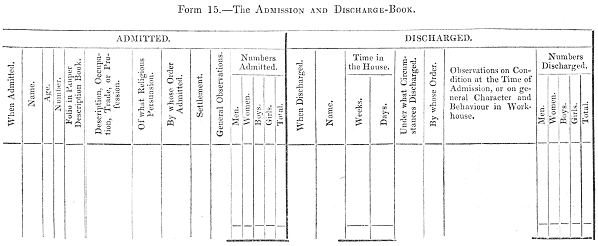
Workhouse Admissions and discharges record form.
© Peter Higginbotham.
One of the main responsibilities of the Commissioners was to produce an annual report summarizing their activities and the progress of Act's operation. The report also included a wealth of statistics which aimed to demonstrate significant reductions in the overall costs of poor relief resulting from the new system.
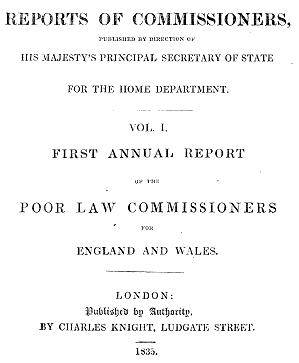
The Commissioners' First Annual Report in 1835
© Peter Higginbotham.
Although the Poor Law Commissioners ultimately reported to Parliament, they operated in a rather autonomous manner which resulted in criticism from some who referred to them as the Three Kings of Somerset House. The Commissioners also suffered bad publicity in 1845 as a result of the Andover workhouse scandal where, it emerged, conditions were so harsh that inmates had resorted to scavenging for decaying meat from the bones that they had been set to crush.
The Poor Law Board
In December 1847, the Poor Law Commission was replaced by a new Poor Law Board, with Charles Buller as its President, and a membership comprising the Home Secretary, The Chancellor of the Exchequer, the Lord Privy Seal, and the Lord President of the Council, plus two Secretaries. Former Commissioner George Nicholls became the Board's new permanent secretary.
The Local Government Board
In 1871, responsibility for health and poor relief was taken over by the Local Government Board, which was itself succeeded in 1919 by the Ministry of Health.
Union Administration
The Board of Guardians
A local Board of Guardians administered each Poor Law Union's activities. There were two classes of Guardian, namely elected and ex officio. Elected Guardians had to be rate-payers occupying property worth at least £25 a year. They were elected annually, usually at the start of April, by the rate-payers of each parish that made up the Union. (Suitably qualified women had been eligible from the outset to stand for election, although it not until 1875 in Kensington that the first female Guardian was elected.) Ex officio Guardians were entitled to Board membership by virtue of their office as local magistrates. The powers and duties of the two classes were the same.
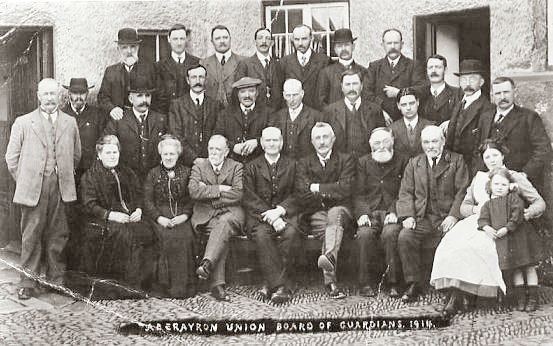
Aberayron Board of Guardians, 1914.
Courtesy of Stephen Thomas.
The Board of Guardians met weekly or fortnightly, usually in a board-room at the Union's workhouse like this one at Sturminster which is still used as a meeting room today:
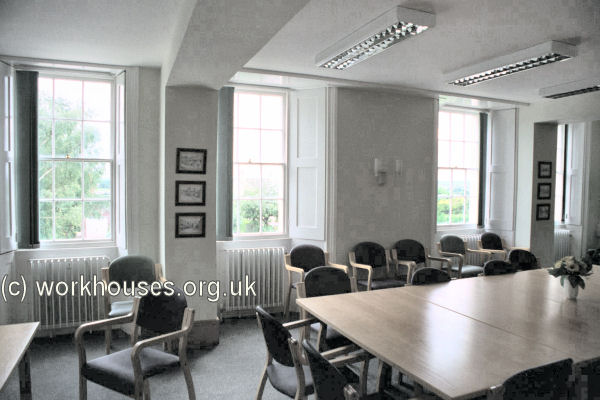
Sturminster Board Room, 2000.
© Peter Higginbotham.
The sizes of Boards varied enormously, ranging from Gravesend and Milton Union in Kent with 8 Guardians representing its two constituent parishes (total population 9,445), to Louth in Lincolnshire with 90 Guardians representing its 88 parishes (total population (25,214).
The usual order of business at each meeting was:
- Minutes of last meeting
- Business arising therefrom
- Continuance of relief, and the applications of relief made since the last meeting.
- New applications for relief
- Reports upon the state of the workhouse, and all books and accounts
- The treasurer's account
- Any other business
Meetings required a minimum of three members for business to be conducted and it was not uncommon for meetings of the Board (and of various sub-committees that sprang up) to be dominated by a few active members. In some cases Guardians were re-elected without opposition for many years. In 1899, the vice-chairman of the Chelmsford Guardians had been a member for forty years!
The minutes of the Guardians' meeting often provide a valuable insight into the operation and management of the workhouse. For an example, see the transcript of the 1835-6 minutes of the Abingdon Board of Guardians.
Although Guardians were forbidden from directly supplying goods to the Union, Guardians with local business interests could use their Board membership to develop their business, political and social contacts.
The Visiting Committee
Various sub-committees came into existence to look after specific areas of Union or workhouse activities. One of these was the Visiting Committee which consisted of several members of the Board of Guardians. Their job was to visit the workhouse each week and to check that it was being run properly, that the inmates were being treated properly, and to listen to any complaints. The results of their inspection were recorded in a special Visitors Book. As guidance, they were given fourteen specific questions to address:
- Is the Workhouse, with its wards, offices, yards, and appurtenances, clean and well ventilated in every part, and is the bedding in proper order? If not, state the defect or omission.
- Do the inmates of the Workhouse, of all classes, appear clean in their persons, and decent and orderly in their behaviour ; and is their clothing regularly changed?
- Are the inmates of each sex employed and kept at work as directed by the Guardians, and is such work unobjectionable in its nature? If any improvement can be suggested in their employment, state the same.
- Are the infirm of each sex properly attended to, according to their several conditions?
- Are the boys and girls in the school properly instructed as required by the regulations of the Commissioners, and is their industrial training properly at- tended to?
- Are the young children properly nursed and taken care of, and do they appear in a clean and healthy state? Is there any child not vaccinated?
- Is regular attendance given by the Medical Officer? Are the inmates of the Sick-wards properly tended? Are the nurses efficient? Is there any infectious disease in the Workhouse?
- Is there any dangerous lunatic or idiot in the Workhouse?
- Is Divine Service regularly performed? Are prayers regularly read?
- Is the established dietary duly observed? Are the prescribed hours of meals regularly adhered to?
- Are the provisions and other supplies of the qualities contracted for?
- Is the classification properly observed?
- Is any complaint made by any pauper against any officer, or in respect of the provisions or accommodations? If so, state the name of the complainant, and the subject of the complaint.
- Does the present number of inmates in the Workhouse exceed that fixed by the Poor Law Commissioners?
The Clerk
Among the duties of a Clerk were:
- To attend all meetings of the Board of Guardians, and to keep punctually minutes of every meeting minutes in a book, and to submit the same to the presiding Chairman at the succeeding meeting for his signature.
- To keep, check, and examine all accounts, books of accounts, minutes, books, and other documents, relating to the business of the Guardians, and from time to time to produce all such books and documents to the Auditor of the Union.
- To peruse and conduct the correspondence of the Guardians, and to preserve the same, as well as all Orders of the Commissioners, and letters received, together with copies of all letters sent, and all letters, books, papers, and documents belonging to the Union.
- To prepare all written contracts and agreements to be entered into by any parties with the Guardians, and to see that the same are duly executed.
- To prepare and transmit all reports, answers, or returns, as to any question or matter which are required by the Regulations of the Poor Law Commissioners.
- To conduct duly and impartially, the annual or any other Election of Guardians.
Official communications from a Union were sealed with a special red wax into which was impressed the Union seal.

The Abingdon Union seal's inscription:
THE GUARDIANS
OF THE
ABINGDON
UNION
IN THE COUNTIES OF
BERKS & OXFORD"
The Treasurer
The main duties of a Treasurer were:
- To receive all monies paid to the Guardians.
- To pay out all orders for money belonging to the Guardians.
- To keep an account of all monies received and paid by him, to balance the same at Lady Day and Michaelmas in every year, and to render an account of such monies to the Guardians.
- To receive the monies payable to him as Treasurer of the Union, under any Act of Parliament or other authority of law.

Workhouse office stamps from the Cricklade and Wootton Bassett Union at Purton.
Courtesy of Waterperry Gardens museum.
© Peter Higginbotham.
The Relieving Officer
The main duties of a Relieving Officer were:
- To receive applications for relief, and forthwith to examine into the circumstances of every case by visiting the house of the applicant, and making all necessary inquiries into the state of health, the ability to work, the condition and family, and the means of such applicant, and to report the results of his inquiries to the Guardians at their next meeting, and also to visit from time to time, all paupers receiving relief.
- In any case of sickness or accident requiring relief by medical attendance, to procure such attendance from the District Medical Officer.
- To ascertain from the District Medical Officer the names of any poor persons attended or supplied with Medicines.
- In every case of sudden or urgent necessity, to afford relief to the destitute person, either by giving such person an order of admission into the Workhouse, and conveying him thereto, if necessary, or by affording him relief out of the Workhouse, provided that the same be not given in money, whether such destitute person be settled in any Parish comprised in the Union or not.
- To report to the Guardians all cases reported to him by an Overseer, and to obey the direction of the Guardians with reference to the relief administered in such cases.
- Duly and punctually to supply the weekly allowances of all paupers belonging to his district.
- To visit, relieve, and otherwise attend to non-settled poor, being within his district.
- To present his weekly accounts to the Clerk for his inspection and authentication before every ordinary meeting of the Guardians, and to the Guardians, for their approval.
- To submit to the Auditor of the Union all his books, accounts, and vouchers.
- To assist the Clerk in conducting and completing the annual or other election of Guardians.
The District Medical Officer
Unions were generally too big an area for a single medical practitioner to cover alone and were usually divided into several districts, each of which was allocated to a District Medical Officer. District Medical Officers were generally employed on an annual contract which, as well as attendance on the sick, usually included the supply of any necessary medicines. For example, in 1835, the Guardians' minutes of Abingdon Union recorded that James Hester was appointed at £110 per annum "to include all cases of casual poor, accidents, surgery and midwifery, and to supply medicines, ointments, bandages and leeches".
A District Medical Officer's main duties were:
- To attend duly and punctually upon all poor persons requiring medical attendance within the District of the Union assigned to him, and supply the requisite medicines to such persons according to a written or printed order of the Guardians, or of a Relieving Officer of the Union, or of an Overseer.
- To make a return to the Guardians at each meeting of the date of every attendance, and the other particulars required.
Workhouse Administration and Staff
The Master
The Master was responsible to the Union and to the Poor Law Commissioners for the proper running and administration of the workhouse. He was also required to be "a friend and protector of the inmates".
A workhouse Master had to be at least 21 years old, able to keep accounts, and "a person of sufficient education, strength of will, and firmness of purpose, whilst he is considerate and gentle in his bearing, without servility or disrespect to the guardians and the higher officers, and without intolerance or laxity to the other officers or inmates." He was also to "have due control over himself, and never exhibit or allow others to exhibit, violence of temper, or use profane or irritating language."
A Master held office for life, unless he resigned or became incapable of discharging his duties. Where, as often happened, the Master and Matron were married, and the wife died, resigned or was dismissed, then the Master had to vacate his post unless the Guardians and Poor Law Commissioners agreed to re-appoint him. Some Masters were indeed very long-serving, for example George Edward Douglas was Master of St Marylebone workhouse from 1862 to 1894. Between 1835 and 1918, Abingdon workhouse had only three different Masters.
Amongst the Master's numerous duties were:
- To admit paupers into the workhouse.
- To ensure new male inmates are searched, cleansed, clothed and classified.
- To enforce industry, order, punctuality and cleanliness.
- To read prayers to the paupers before breakfast and after supper each day.
- To hold a daily roll-call and inspection of inmates.
- To provide work, training or occupation for the inmates.
- To inspect the male sleeping wards at 11am daily.
- To superintend the preparation and distribution of food.
- To say grace before and after meals.
- To visit the male sleeping wards before 9pm in winter and 10pm in summer to see that all male paupers are in bed, and all fires and lights not necessary for the sick are extinguished.
- To receive the workhouse keys from the Porter at 9pm and return them to him at 6am.
- To see that the male paupers are properly clothed, and that their clothes are kept in proper repair.
- To register all Births and Deaths in the workhouse.
- To send for the Medical Officer if any pauper is taken ill or becomes insane, and to inform their nearest relation in the workhouse, and in the case of dangerous sickness, to send for the Chaplain, and any relative or friend whom the pauper may desire to see.
- To ensure that no pauper near death is left unattended, day or the night.
- To inform the Medical Officer and next of kin of any death in the workhouse. If the body is not removed within a reasonable time, to provide for its interment.
- To deliver an inventory of the clothes and other property of any pauper who may have died in the Workhouse, to the Guardians at their next meeting.
- To submit, at each Board meeting, an estimate of provisions and other articles required for the Workhouse.
- To ensure that the workhouse building, fixtures, fittings etc. are kept clean and in good order.
- To report at each meeting of the Guardians on the number of the inmates in the workhouse
- To bring before the Visiting Committee or Guardians any pauper inmate wishing to make a complaint.
- To report to the Medical Officer and Guardians all cases where any restraint or compulsion is used towards any pauper inmate of unsound mind.
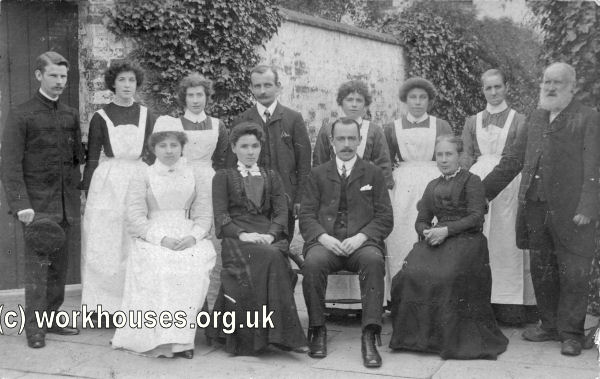
Master, Matron, and staff at Caistor workhouse, 1905.
The Matron
The Matron acted as a deputy for the Master in his absence, and also had specific responsibilities of her own, mostly relating the supervision of female inmates and the workhouse's domestic arrangements. Her duties were:
- To oversee the admission of female paupers and pauper children under seven.
- To oversee the employment and occupation of female paupers, and to assist the Schoolmistress in training up the children so as best to fit them for service.
- To inspect the female sleeping wards at 11am daily.
- To visit the female sleeping wards before 9pm in winter and 10pm in summer to see that all female paupers are in bed, and all fires and lights not necessary for the sick or for women suckling their children are extinguished.
- To pay particular attention to the moral conduct and orderly behaviour of the females and children, and see they are clean and decent in their dress and persons.
- To superintend the making and mending of the linen and clothing supplied to the inmates, and ensure that all such clothing be properly numbered and marked on the inside with the name of the Union.
- To see that every pauper has clean linen and stockings once a week, and that all the beds and bedding are kept in a clean and wholesome state.
- To superintend the washing, drying, and getting up of the linen, stockings, and blankets, and to see that the same is not dried in the sleeping-wards, or in the sick-wards.
- To take proper care of the children and sick paupers, and to provide the proper diet for the same, and for women suckling infants, and to provide any necessary changes of clothes and linen.
- To assist the Master in: enforcing the observance of good order, cleanliness, punctuality, industry, and decency of demeanour among the paupers; cleansing and ventilating the sleeping-wards and the dining-hall, and all other parts of the premises; placing in store and taking charge of the provisions, clothing, linen, and other articles belonging to the Union.
- When requested by the Porter, to search any female entering or leaving the Workhouse.
Below is a job advertisement from 1873 for a Master and Matron at Southwell Union workhouse in Nottinghamshire.
MASTER AND MATRON WANTED
The Chaplain
The duties of a Chaplain were:
- To read prayers and preach a sermon to the workhouse inmates every Sunday, and on Good Friday and Christmas Day.
- To examine the children, and to catechise such as belong to the Church of England, and to record the dates of attendance, and the general progress and condition of the children, and the moral and religious state of the inmates generally.
- To visit the sick paupers, and administer religious consolation to them.
The School-master and School-mistress
The duties of a School-master or School-mistress included:
- To instruct the boys and girls, for at least three hours each day, in reading, writing, arithmetic, and the principles of the Christian Religion, and such other instruction as may fit them for service, and train them to habits of usefulness, industry and virtue.
- To regulate the discipline and arrangements of the school, and the industrial and moral training of the children.
- To accompany the children when they quit the Workhouse for exercise, or for attendance at public worship
- To keep the children clean in their persons, and orderly and decorous in their conduct.
- To assist the Master and Matron respectively in maintaining due subordination in the Workhouse.
Below is a job advertisement from 1873 for a Schoolmistress at Hoxne Union workhouse in Suffolk.
SCHOOLMISTRESS WANTED
The salary will be £25 per annum, with such further sums as the Committee of Council on Education may from time to time award, together with board, lodging, and washing in the Workhouse.
The candidates must be specially certificated by the Committee of Council in one of the first three grades.
Applications in the handwriting of the candidates, stating age and present occupation, with testimonials as to character and fitness for the office must be sent to me on or before Saturday, September 13th next.
Candidates will be required to attend at the Board-room at Stradbroke on the day of the election, at eleven o'clock in the forenoon, and the person appointed will be required to enter upon the duties of the office immediately after the election.
Although most matters relating to the poor law and workhouses were centrally administered by the Poor Law Commissioners, and their successors the Poor Law Board, education in workhouses came partly under the remit of the Committee of Council on Education (CCE), established in 1839. From 1846, largely as a result of the efforts of the CCE's Assistant Secretary, James Kay-Shuttleworth, an annual government grant of £30,000 was made towards the salaries of teachers in pauper schools. CCE inspectors made regular visits to workhouse schools and their reports provide valuable information about the schools' operation. The CCE was also involved in the training and certification of teachers. They introduced a grading scale which had four main stages: Permission, Probation, Competency, and Efficiency. Each stage had three sub-sections, numbered 1 to 3, giving an overall 12-level scale of qualification ranging from Permission Section 3 at the bottom to Efficiency Section 1 at the top. The suggested requirements for stage were:
| Permission |
|
| Probation |
|
| Competency |
|
| Efficiency |
|
In 1850, the Committee opened a training school for workhouse teachers at Kneller Hall near Twickenham. However, the scheme was not successful and failed to attract sufficient applicants. The school closed in 1855 and in 1857 the building was acquired by the army as the home for the Royal Military School of Music, which it remains to the present day.
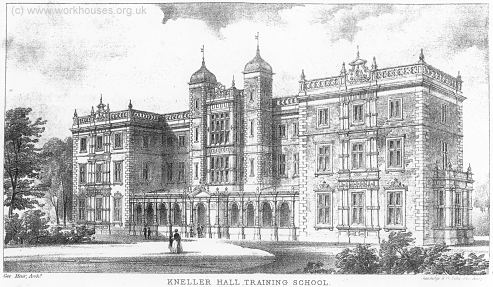
Kneller Hall, c.1850.
© Peter Higginbotham.
On 4th June, 1850, the Education Committee's Inspector for the East and Midlands region, Mr Bowyer, visited Southwell workhouse and reported that its school had 19 boys and 31 girls and infants, each having separate schoolrooms. A schoolmaster and schoolmistress were employed by the Guardians: Charles Spray (Effective Section 1) received a salary of £45 per annum, and Maria Richardson (Probation Section 2) received £20. The schools "Books and Apparatus" were listed as "Irish books and maps etc.". The boys' school was "in its usual efficient condition" but the girls' school was "unsatisfactory".
A year later, in August 1851, there were 18 boys and 15 girls and infants at Southwell. However, William Sumner (Probation Section 2 at £22.17s. per annum) had become the school-master, subsequently replaced by Thomas Driver (Probation Section 3 at £20 per annum). The schoolmistress was now Susan Thompson (Probation Section 1 at £21.2s. per annum). Mr Bowyer's observations on this occasion make interesting reading: "The cause of the compulsory resignation of the late master and mistress is a remarkable instance of the low tone of morality so frequently exhibited by the present race of workhouse teachers. She was old enough to have been his mother."
The Workhouse Medical Officer
Unlike the District Medical Officer, the Workhouse Medical Officer's duties were confined to the workhouse premises and its inmates. Among the duties of a Workhouse Medical Officer were:
- To attend at the Workhouse at the periods fixed by the Guardians, and also when sent for by the Master or Matron.
- To attend duly and punctually upon persons in the Workhouse requiring medical attendance, and to supply the requisite medicines to such persons.
- To examine paupers on their admission into the Workhouse.
- To give directions and make suggestions as to the diet, classification, and treatment of sick paupers, and paupers of unsound mind, and to report to the Guardians any pauper of unsound mind in the Workhouse deemed to be dangerous, or fit to be sent to a Lunatic Asylum.
- To give instructions as to the diet or treatment of children and women suckling children, and to vaccinate such of the children as may require vaccination.
- To report any defect in the diet, drainage, ventilation, warmth, or other arrangements of the Workhouse, or any excess in the number of any class of inmates, which he may deem to be detrimental to the health of the inmates.
- To report any defect in the arrangements of the infirmary, and in the performance of their duties by the nurses of the sick.
- To make a return of the date of every attendance, and the other particulars, and to enter in such return the death of every pauper who shall die in the Workhouse, together with the apparent cause thereof.
- To enter in such book, the proper dietary for the sick paupers in the house in so many different scales as he shall deem expedient.
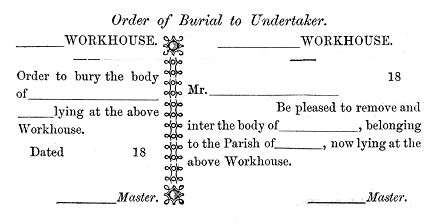
Workhouse burial order form.
© Peter Higginbotham.
The Nurse
The duties of a Nurse were:
- To attend upon the sick in the sick and lying-in wards, and to administer to them all medicines and medical applications, according to the directions of the Medical Officer.
- To inform the Medical Officer of any defects which may be observed in the arrangements of the sick or lying-in ward.
- To take care that a light is kept at night in the sick-ward.
Below is a job advertisement from 1873 for a Nurse at Uckfield Union workhouse in Sussex.
FEMALE NURSE WANTED
Applicants must be single, or widows without encumbrance, between 25 and 40 years of age. The salary will be £20 per annum with lodgings and the usual rations in the Workhouse.
The person appointed will be required to devote the whole of her time to the service of the Board in the performance of the duties of a Nurse, and of such other duties as may be required of her by the Matron.
No person can be appointed who is unable to read written directions upon medicines.
The Porter
The duties of a Porter were:
- To keep the gate, and to prevent any unauthorised person from entering into or going out of the house.
- To keep a book in which he shall enter the name and business of every person entering or leaving the Workhouse.
- To receive all paupers who apply or present themselves for admission, and if the Master and Matron be both absent, to place such paupers in the receiving-ward until the Master or Matron return.
- To examine all parcels and goods before they are received into the Workhouse, and prevent the admission of any spirituous or fermented liquors, or other articles contrary to Law.
- To search any male pauper entering or leaving the Workhouse whom he may suspect of having possession of any spirits or other prohibited articles, and in the case of any female, to cause the Matron to be called for the purpose of searching her, if necessary.
- To examine all parcels taken by any pauper out of the Workhouse, and to prevent the undue removal of any article from the premises.
- To lock all the outer doors, and take the keys to the Master, at 9pm every night, and to receive them back from him every morning at 6am; and if any application for admission to the Workhouse afterwards be made, to apprise the Master forthwith of such application.
- To assist the Master and Matron in preserving order, and in enforcing obedience and due subordination in the Workhouse.
- To inform the Master of all things affecting the security and order of the Workhouse.
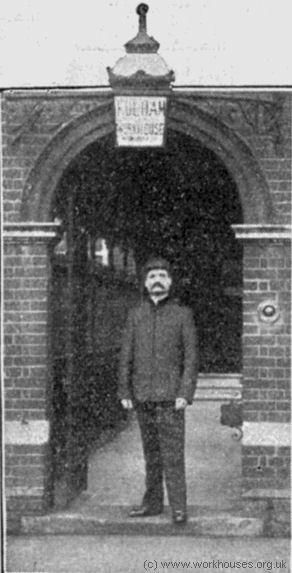
Porter at Fulham workhouse, c.1900. © Peter Higginbotham. |
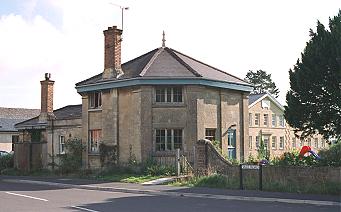
Pewsey Porter's Lodge, 2000. © Peter Higginbotham. |
Superintendent of Outdoor Labour
From the 1860s, some Unions, particularly in urban areas set up Labour Yards or Stone-yards and employed the "labour test" — that relief to those outside the workhouse would be given only in return for a prescribed amount of labour. The work, usually stone-breaking, oakum picking, or wood chopping, was overseen by a Superintendent of Outdoor Labour whose duties were:
- To superintend any able-bodied paupers not inmates of the Workhouse who may be set to work by the Guardians.
- To take care that they perform the work respectively assigned to them.
- To report truly to the Guardians respecting the performance of such work.
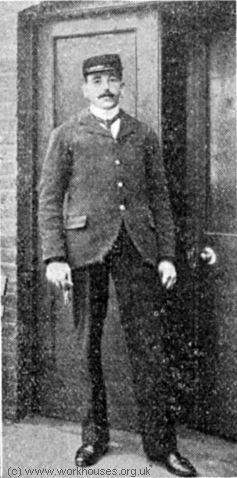
Workhouse Labour Master c.1900. © Peter Higginbotham.
Below is a job advertisement from 1873 for a Porter and Labour Master at Oxford workhouse.
The duties of the Porter will be to keep the door, to attend to the cutting up and serving the meals, the bathing of the male tramps, the fumigation of their clothes, and the cleanliness of the male inmates generally; he will also have to perform all the duties prescribed for him by the Orders of the Local Government Board, and also any the Guardians may from time to time think reasonable.
The duties of the Tramps' Attendant will be to assist the Porter to keep the door, to superintend the bathing of the female tramps and the fumigation of their clothes; she will also have to perform any duties which the Guardians may from time to time think reasonable.
The duties of the Labour Master will be to superintend the labour of the male inmates in the Workhouse.
All the above-named officers will be expected to make themselves generally useful under the direction of the Master and Matron.
The Salary of the Porter will be £20 per annum; that of the Tramps' attendant £10; and that of the Labour Master £20 per annum, together with board, lodging and washing in the establishment.
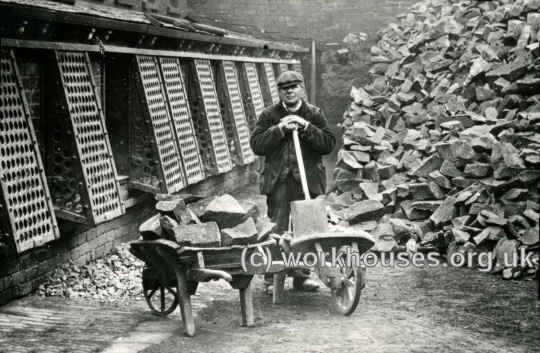
Hackney workhouse stone yard c.1900
© London Borough of Hackney Archives Dept.
Cook
In many smaller workhouse, the cooking was carried out by female inmates under the supervision of the matron. However, in the latter part of the nineteenth century, it became increasingly common for workhouses to have a paid (and possibly even trained) cook.
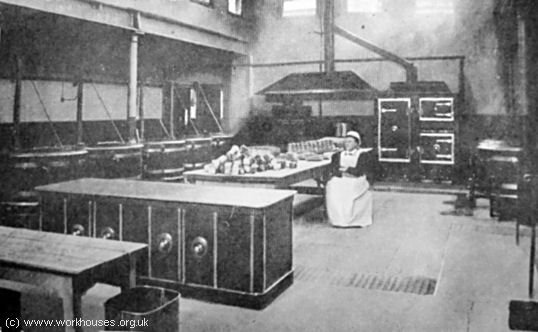
Holborn workhouse kitchens and cook, c.1900.
© Peter Higginbotham.
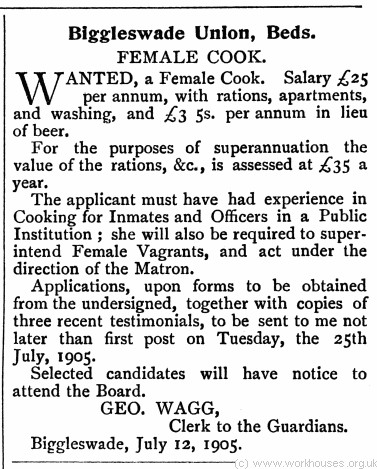
Biggleswade advertisement for cook, 1905.
© Peter Higginbotham.

Sheffield Fir Vale workhouse kitchens, 1902.
© Pamela Repussard.
Fireman
Some large workhouses operated their own fire-brigade and mainatined a fire engine. The Stoke-upon-Trent workhouse fire-brigade in 1906 are pictured below.
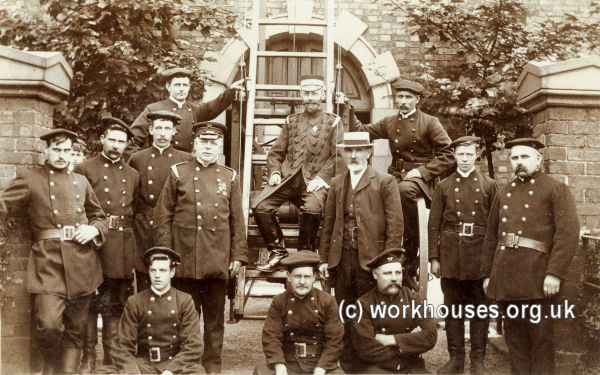
Stoke workhouse fire brigade, c.1906.
© Peter Higginbotham.
Other Staff
Workhouses, particularly the larger ones, might employ a variety of other staff. These could includ a baker (if the workhouse had its own bakery), laundry supervisor, and superintendent of the receiving ward who looked after the area where new arrivals were initially held. Supervising the workhouse casual ward was sometimes a duty that the porter undertook, perhaps with his wife looking after the female section, although some workhouses employed a 'tramp major' — a former tramp who was given board and lodging in return for undertaking this duty.
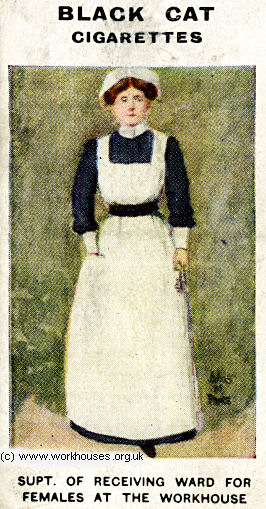
Superintendent of the Female Receiving Ward in a London workhouse, c.1920.
© Peter Higginbotham.
Parish Administration
From 1834, administration of poor relief was transferred from the parish to the Poor Law Union. However, the collection of the poor rate within each parish continued to be performed by parish overseers. Overseers performed a number of other local administrative duties relating to poor relief, education and health, often in conjunction with Union officials such as the Board of Guardians or the Relieving Officer. The overseers' duties included such matters as compiling lists of those eligible for jury service, ensuring the maintenance of graveyards, providing and maintaining a fire engine, and protecting the village green from damage by cattle — in the latter case, they were empowered to sell any manure that was left behind!
The Local Government Act of 1894 transferred the civil functions of a parish to parish councils and parish meetings. However, the overseer's role as rate-collector continued until 1925 when a unified system of rating authorities was created.
Unless otherwise indicated, this page () is copyright Peter Higginbotham. Contents may not be reproduced without permission.



